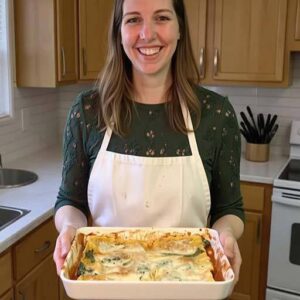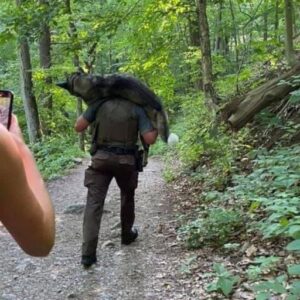When I was young, we spent summers at Grandma’s farmhouse. One night, I was told to stay in my room with the door shut, as they had a “grown-up” matter to discuss.
After that, our visits to Grandma ceased abruptly. Years later, I learn accidentally that my grandma was…
…not who I thought she was. Or maybe she was, and everyone else just couldn’t handle it.
Her name was Manuela. Everyone called her “Mamá Nela,” even the neighbors. Her house smelled like guava jam and wood polish. I remember her hands—warm and always busy, either kneading dough or folding laundry with military precision.
But after that summer night, she vanished. No goodbye. No funeral. No updates.
As a kid, I asked, “Why don’t we go to Mamá Nela’s anymore?” and got the same answer every time:
“Things happened. You’ll understand when you’re older.”
Well, I got older.
Years passed. I left home, worked in two different cities, got my own apartment. One afternoon, I went to help my mom clean out her garage—she was finally downsizing—and found a cracked shoebox sealed with duct tape.
I peeled it open, expecting maybe old bills or Christmas cards. But inside were a dozen letters, all in the same cursive, addressed to my mom, my aunt, and even me. From Mamá Nela.
None of them had been opened.
My throat went dry. I took one, dated 2004, and read the opening lines:
“Mi querida Alma, I know you hate me. I do not blame you. But before I go, I want you to know why I did what I did…”
I was floored. She had written to all of us, year after year, and not a single letter had made it past this box.
I took them home, read every single one. Some were simple updates—how the garden was doing, how she missed my laugh. But a few were harder. They talked about “the night everything changed.”
Apparently, my grandma had refused to sign over the land the farmhouse sat on.
My uncle, Tadeo, had cooked up a plan to develop the acreage. A friend of his worked with a construction firm, and there was potential to make a lot of money by selling it off for a shopping center.
But the land wasn’t his. It was Mamá Nela’s. And she had one condition—it stays in the family, untouched, until her last breath.
Tadeo didn’t take it well.
That “grown-up matter” they discussed the night I was told to stay in my room? It was a full-blown argument. My mom, my aunt Graci, and Tadeo shouting in the kitchen while Mamá Nela refused to budge.
Apparently, Tadeo told her that if she didn’t cooperate, he’d make sure none of us ever saw her again. He thought he was bluffing. But she called it.
She stayed on that land, by herself, for another six years. Then she moved into a small assisted living apartment in the same town, near her church friends.
None of us ever visited her. Not because she didn’t want us. But because they blocked every attempt.
I was shaking. I mean, I was sixteen when she died. I could’ve called her. Written her. If only I’d known.
I showed my mom the letters. At first, she looked embarrassed. Then defensive.
“She chose land over family,” she said, arms crossed.
“No,” I said. “She chose her right to decide what to do with her own land. That’s not the same.”
We didn’t speak for a week after that. But the seed was planted.
And I couldn’t leave it alone.
I took two weeks off work and drove to the old town. Her farmhouse was still there—but barely. The grass was waist-high, the paint peeling. Someone had spray-painted a tag on the mailbox.
But it hadn’t been sold. No “For Sale” sign. No construction.
I tracked down the neighbor, Señora Carmen. She remembered me instantly. Invited me in for tamarind juice and told me everything.
“She used to sit on the porch every evening,” she said, voice cracking. “Said maybe one day you’d come back.”
I asked about the land, the will, all of it. Turns out Mamá Nela had left the property in a trust, with very specific instructions. It was to go to me—but only once I turned thirty, and only if I still remembered her.
I couldn’t believe it.
I was twenty-eight.
The neighbor gave me the number of a local lawyer who had handled the estate. I met him the next day.
He pulled up the paperwork, scanned it, and said, “Yep. You’re the beneficiary. All you need to do is sign a few things.”
I walked out of that office with a manila envelope that held the deed to my grandmother’s land. My name. Not Tadeo’s. Not my mom’s. Mine.
I sat in my car, just staring at it.
That night, I drove back to the farmhouse. I slept there, even though there was no power. Just me, my sleeping bag, and the stars.
I cried. Not because I was sad—but because I could feel her there, somehow. Her stubborn love. Her quiet defiance.
I decided something that night.
I wasn’t going to sell the land. I wasn’t going to develop it, flip it, or let it rot.
I was going to bring it back.
Not to what it was—but to something new that still honored her.
The next six months were a blur. I moved back to town part-time, cleaned the house, hired local contractors to help. I planted fruit trees again. Repaired the old wooden swing.
Then I started a small weekend café—“La Casa de Nela.”
Just coffee, pan dulce, and conversation. Locals showed up out of curiosity at first. Then nostalgia. Then loyalty.
I hung one of her handwritten recipes—her guava empanadas—on the wall.
My aunt Graci came one afternoon, unannounced. She sat in the corner with her tea, just watching me.
After an hour, she walked up and said, “She would’ve loved this.”
Then she handed me a folded paper napkin. Inside was a tiny pressed violet.
“She gave this to me the day we stopped speaking. Told me I’d need it when I remembered how to be soft again.”
I hugged her.
My mom came a week later. She didn’t say much. Just stood at the edge of the garden, hands in her pockets. I watched her eyes land on the swing.
“She’d sing on that swing,” she said. “Every night.”
She didn’t apologize, not directly. But when she asked, “Need help washing dishes?”—I knew that was her way.
Even Tadeo showed up. Balding, with a limp I hadn’t known about. Said he was in town for a conference.
He stood awkwardly in front of the counter, staring at the menu. Then he said, “She was tougher than all of us.”
I didn’t argue.
I handed him a guava empanada and said, “On the house.”
He took one bite and started crying. Not loud. Just a single tear down his cheek.
We didn’t talk about the past. We didn’t need to.
By the time I turned thirty, the place had a steady rhythm. Locals brought their grandkids. Church ladies knitted on the porch. Someone even offered to host a community book club there.
And every year, on the same week in July—the week of that “grown-up conversation” I’d been shut out of—I host an open mic night in her memory.
We call it “The Night Nela Said No.”
People laugh, cry, share their own stories of boundaries and second chances.
I always start the night by reading one of her letters.
And every year, someone new tells me they wish they’d known her.
My answer’s always the same:
“She never really left. She was just waiting for us to come back.”
Life has this quiet way of circling back to truth.
Sometimes, the people you think are “difficult” are just unwilling to bend for the wrong reasons. And sometimes, family is less about blood and more about who chooses to remember you when it’s inconvenient.
Mamá Nela didn’t need us to agree with her. She just needed us to see her.
I’m so damn glad I finally did.
If this story touched you, give it a like or share it with someone who might need to remember a loved one they’ve lost touch with. Maybe it’s not too late.





